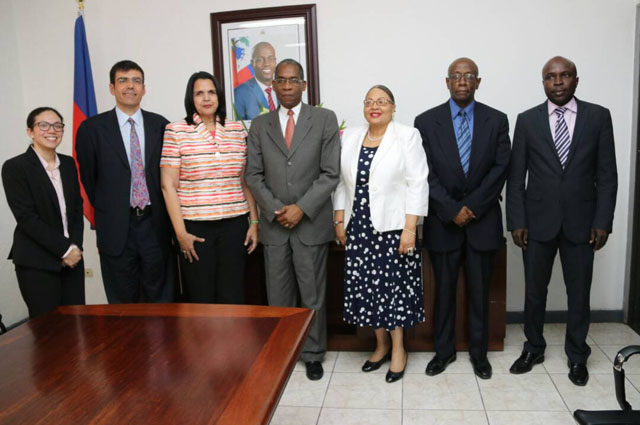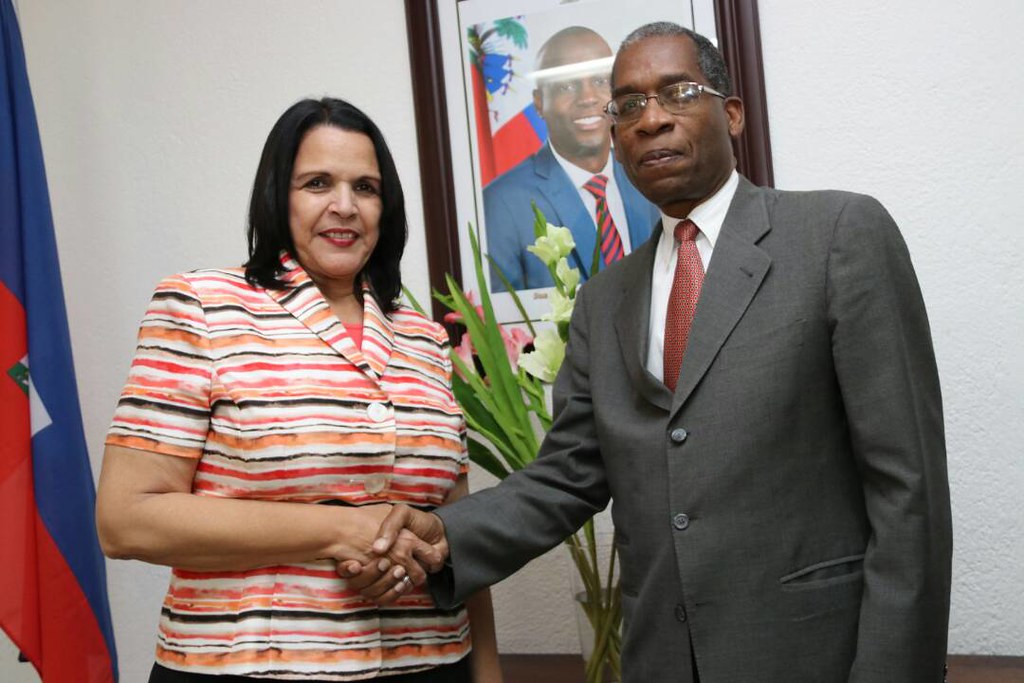
A PGA delegation travelled to Haiti on 13-14 July 2017 to meet with Haitian officials in the framework of Consultations on the ratification of international conventions regarding peace and security, arms control, the Rule of Law and the fight against impunity. The delegation was composed of Minou Tavarez Mirabal, former PGA President and legislator from the Dominican Republic and current Chair of PGA’s development advisory committee, Dr. David Donat Cattin, Secretary-General of PGA, and Ms. Melissa Verpile, PGA’s Program Officer for International Law and Human Rights.
This field mission followed the PGA mission of March 2015 on the Rome Statute of the International Criminal Court (ICC) and that of February 2017 on the ratification of the Biological Weapons Convention (BWC) and the Arms Trade Treaty (ATT), to promote with the Executive and Legislative powers the ratification of all three aforementioned treaties while engaging with the President of the Supreme Court and relevant stakeholders.
PGA’s delegation was received by the Cabinet of the President of the Republic of Haiti, led by its Director, Mr. Wilson Laleau, former Minister of Commerce, Industry, Economy and Finance. On behalf of the presidency, Mr. Laleau and the Special Advisor to the President, Mr. Gerd Pasquet, emphasized that the priorities of the current administration align with the ratification of the BWC, ATT and Rome Statute of the ICC, considering the fact that without proper arms trade regulation and mechanisms to ensure that biological materials are not weaponized, there can be no stability, peace and security; and without the rule of Law there can be no justice. In this regard, steps have already been taken to reinforce the domestic legal order, as the Executive sent the new Criminal Code and Code of Criminal Procedure to the Chamber of Deputies for consideration and adoption. The PGA Delegation understood that the new Criminal Code includes certain core crimes and principles of the Rome Statute. The Cabinet of the President has expressed its willingness to work with PGA to advance the ratification processes.
PGA’s delegation was also received by H.E. Mr. Antonio Rodrigue, Minister of Foreign Affairs, accompanied by his Director of Cabinet, Ambassador Yolette Azor, and Director of Legal Affairs, Mr. Frantz Dorsainvil. The Minister was pleased to engage with the PGA delegation on all three treaties and reiterated the Executive’s commitment regarding the BWC and the ATT. The relevant section of the Ministry of Foreign Affairs has already sent the draft ratification bills to the technical sections of the Parliament following Council of Ministers’ approval. The BWC ratification draft bill will soon be on the agenda of the National Assembly for approval: PGA corroborated this information with the leadership of both Houses of Parliament.
Minister Rodrigue emphasized the need for Haiti to establish control mechanisms to contain potential bacteriological disasters in the case where an illness such as cholera, for example, could be weaponized by a non-State actor, notwithstanding that Haiti does not produce such biological weapons nor is it a gun-manufacturing country.
Regarding the Rome Statute of the ICC, Minister Rodrigue said that he would work with his Cabinet to ensure that the MFA sends a decree on ratification of the Rome Statute to Parliament. Although his office is supportive of PGA’s endeavours in Haiti, Minister Rodrigue explained that many relevant actors in Haitian institutions may express reservations. Some arguments put forth by the Minister of Foreign Affairs, and echoed by the Director General of the Ministry of Justice, Dr. Jean Claudy Pierre, in subsequent meeting, pertained to perception of the Court rather than substantive objections and its interventions in Africa. The PGA delegation explained that African victims do not deserve to be discriminated against because the Court has not yet taken action in situations outside of Africa, while previous international criminal jurisdictions like the International Criminal Tribunal for the former Yugoslavia and the Nuremberg Tribunal focussed exclusively on cases localized in the territories of European States. The arguments raised by officials met by the PGA Delegation did not reflect their personal or positions, which were aligned with the accountability system established by the Rome Statute, but with debate articulated in the media and public fora.
Three recurring arguments advanced in the Haitian context to explain why Haiti signed the treaty in 1999 and did not ratify yet may be summarised as follows, and counter-arguments were considered with great interest:
-
Major powers whose nationals might have committed crimes falling under the competence of the ICC are not States Parties to the Rome Statute and the resulting situations have not been deferred to the Court by the Security Council. Counter-argument: Small and medium powers have all to gain and nothing to lose by being protected by the territorial jurisdiction of the ICC, which is a Court of last resort that can exercise complementary jurisdiction on all crimes committed on the territories of States Parties, including foreigners. If the UN Security Council fails to refer a matter to the ICC, the blame should not be on the Court but on the Council itself, as it is failing to maintain and restore international peace and security.
-
Most cases and situations are in Africa, giving the impression that the ICC only tries individuals from African countries or small countries. Counter-argument: African victims deserve justice, and in Africa there has been several armed conflicts that victimized civilians since 1 July 2002, when the ICC non-retroactive jurisdiction started to operate. African Parliamentarians fully support the ICC interventions. The fact that there is impunity in Syria and other atrocities’ scenarios does not mean that there should be impunity in the DR Congo, Central African Republic or Darfur/Sudan.
-
Haiti should not ratify the Rome Statute merely because most countries of the region, including the Dominican Republic, have ratified said Statute (Haiti, Bahamas and Jamaica are the only Non-States Parties in the CARICOM). Counter-Argument: International cooperation is essential for all States, especially small and medium powers. All South America is a no impunity zone, and the vast majority of States in the Americas are parties to the Rome Statute, including Canada, Mexico and the overwhelming majority of CARICOM and Central American countries. The new Government of Haiti shall benefit from international cooperation.
Pursuant to the meeting with the Minister of Foreign Affairs and the Director General of the Ministry of Justice, PGA had the opportunity to exchange views with the diplomatic community, in particular with representatives of the European Union, Canada, Switzerland and France as well as representatives of the civil society, the President of the Supreme Court (Cour de cassation), Judge Jules Cantave, and parliamentarians. Judge Cantave with other members of the diplomatic community including Amb. Vincent Degert, Head of the Delegation of the European Union, and Amb. Jean Luc Virchaux, Ambassador of Switzerland in Haiti, expressed the support of their respective institutions for strengthening the democratic framework and the rule of Law, emphasising that Haiti’s biggest problem is impunity. Amb. Degert accurately mentioned that the primary responsibility for strengthening Haiti’s justice system and institutions lies with Haitian authorities.
Mr. Ivan Robert, Chargé d’affaires at the Embassy of Canada in Haiti, reiterated his government’s support to the ratification of the BWC and was pleased by the fact the ratification decree had already been sent to the Parliament as well as the article published by a PGA member, Dep. Anouce J. Bernard, president of the Foreign Affairs Committee, on the necessity for Haiti to ratify the BWC (L’urgente nécessité pour l’État haïtien de ratifier la Convention sur les armes bactériologiques).
Ms. Marie Rosy Ducena, Program Manager, National Network for the Defense of Human Rights (RNDDH), mentioned that Haiti needs to reconcile its recent history including the Duvalier dictatorship. In this regard, Haiti, through the Rome Statute ratification and implementation would have additional tools to ensure the effective prevention of international crimes and guaranty the accountability of individuals for such crimes.
On the second day of PGA’s field mission, the delegation was received by the Vice-President of the Senate, Hon. Jean-Marie Junior Salomon, and the Vice-President of the House of Deputies, Hon. Michel Jacques Saint Louis, who both, in unison with their colleagues present at the meeting, expressed their support for the swift parliamentary consideration of BWC and ATT ratification, as well as to the prospective process of ratification of the Rome Statute, which needs to be sent to Parliament for approval. Five prominent Members of Parliament joined PGA: Hon. Jean-Marie Junior Salomon, Vice President of the Senate, Hon. Dieudonne Luma Etienne, First Secretary of the Senate, Hon. Michel Jacques Saint Louis, Vice President of the House of Deputies, Hon. Price Cyprien, Member of the Committees on Foreign Affairs and Finance, Hon. Caleb Desrameaux, President of the Culture and Communication Committee. Also, PGA Members Hon. Jean Willer Jean, First Secretary of the Chamber of Deputies and Hon. Claude Luc Guillaume, Vice Quaestor of the Chamber of Deputies attended the event and reiterated the support for the three treaties.
The PGA Secretariat will continue to work with Haitian Legislators with the view of responding to any request of technical assistance and mobilizing cross-party support for the realization of PGA’s vision, namely, “to contribute to the creation of a Rules Based International Order for a more equitable, safe and democratic world.”
The global PGA membership will intensify its cooperation with Haitian Lawmakers to promote human rights, peace, democracy and the Rule of Law in Haiti, bridging the gap between parliamentarians and relevant national and international actors to reinforce the country’s rightful role as law-abiding nation in the international arena.


